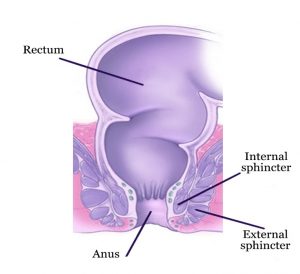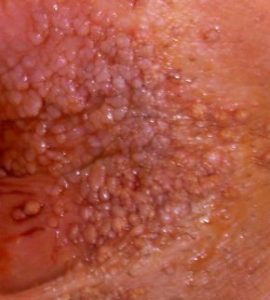What are anal warts?
The anus is the last portion of the large bowel [Figure 1]. It is a short tube surrounded by the sphincter muscles (internal and external) which provide control of bowel motion. The lining of the anus or surrounding skin can become abnormal and give rise to anal warts (cauliflower like raised lesions) [Figure 2]. Untreated anal warts will continue to grow and cause more symptoms [Figure 3]. In some cases anal warts can lead to an increased risk in developing Anal Dysplasia (precancerous condition) and Anal Cancer.

Figure 1 – The anus with surrounding internal and external sphincter muscles

Figure 2 – Warts

Figure 3 – Extensive untreated anal warts
What causes anal warts?
Anal warts are usually sexually transmitted and caused by the human papilloma virus (HPV). HPV is the most common sexually transmitted disease. It is important to note that a person can become infected with HPV even without sexual activity. Coming in direct contact with an infected person and then touching the anal or genital area can transmit genital warts. There are many different types of HPV and the majority of patients with HPV have no symptoms and are not aware they have it.
What are the symptoms of anal warts?
Anal warts are typically painless. Symptoms include the feeling a bump, itchiness, moisture, and bleeding.
How are anal warts diagnosed?
The history and physical examination are important in making the diagnosis of anal warts. An office-based examination includes visual inspection of the skin, finger palpation of the anus, and Anoscopy or Proctoscopy to look inside the anus and rectum. In addition, visual inspection of the genitalia and the mouth is recommended in some patients.
How are anal warts treated?
All genital warts should be treated as they can grow and in some cases turn into precancerous lesions or cancer. Small warts on the skin can be treated by local ointments, topical medications to burn the warts, or liquid nitrogen freezing. Larger warts and those inside the anus require surgical removal in the operating room.
Anal warts can recur as the HPV virus usually infects the skin and remains present long-term. All patients with history of anal and genital warts should have regular follow-ups. After initial removal and treatment of the warts, 2 to 4 visits are advised during the first year and then annual examinations.
What preventive measures or screening is available?
Patient with anal warts should get checked by a properly trained proctologist or a dermatologist (skin doctor) with experience treating warts. Screening for anal warts include visual inspection, finger palpation of the anus, and Anoscopy or Proctoscopy to look inside the anus and rectum.
Having protected sexual intercourse and limiting the number of sexual partners can decrease the risk of HPV transmission and warts. Vaccination against HPV can be helpful but is not a guarantee as the currently available vaccines cover just a few of the HPV types. In order for the vaccination to have any effectiveness, it has to be administered before engaging in any sexual activity. Once infected, the vaccine may not yield any benefit. Smoking cessation is advisable in patients to decrease the risk of progression from HPV infection.
Why is it important to seek expert care with a board certified proctologist and colorectal surgeon?
Anal warts treatment requires a good evaluation of the anus and should be done by doctors who have the expertise to screen and treat this condition. Proper diagnosis and treatment is critical to minimize the risks associated with this condition.

Dr. Maher Abbas is an expert in the treatment of diseases of the colon, rectum and anus. With over a 30-year career in the USA, he has completed advanced surgical training and is American Board Certified in Colon and Rectal Surgery. Dr. Maher Abbas is a Fellow of the American Society of Colon and Rectal Surgeons.
If you would like to schedule a consultation with Dr. Maher Abbas to discuss your case, click here.





